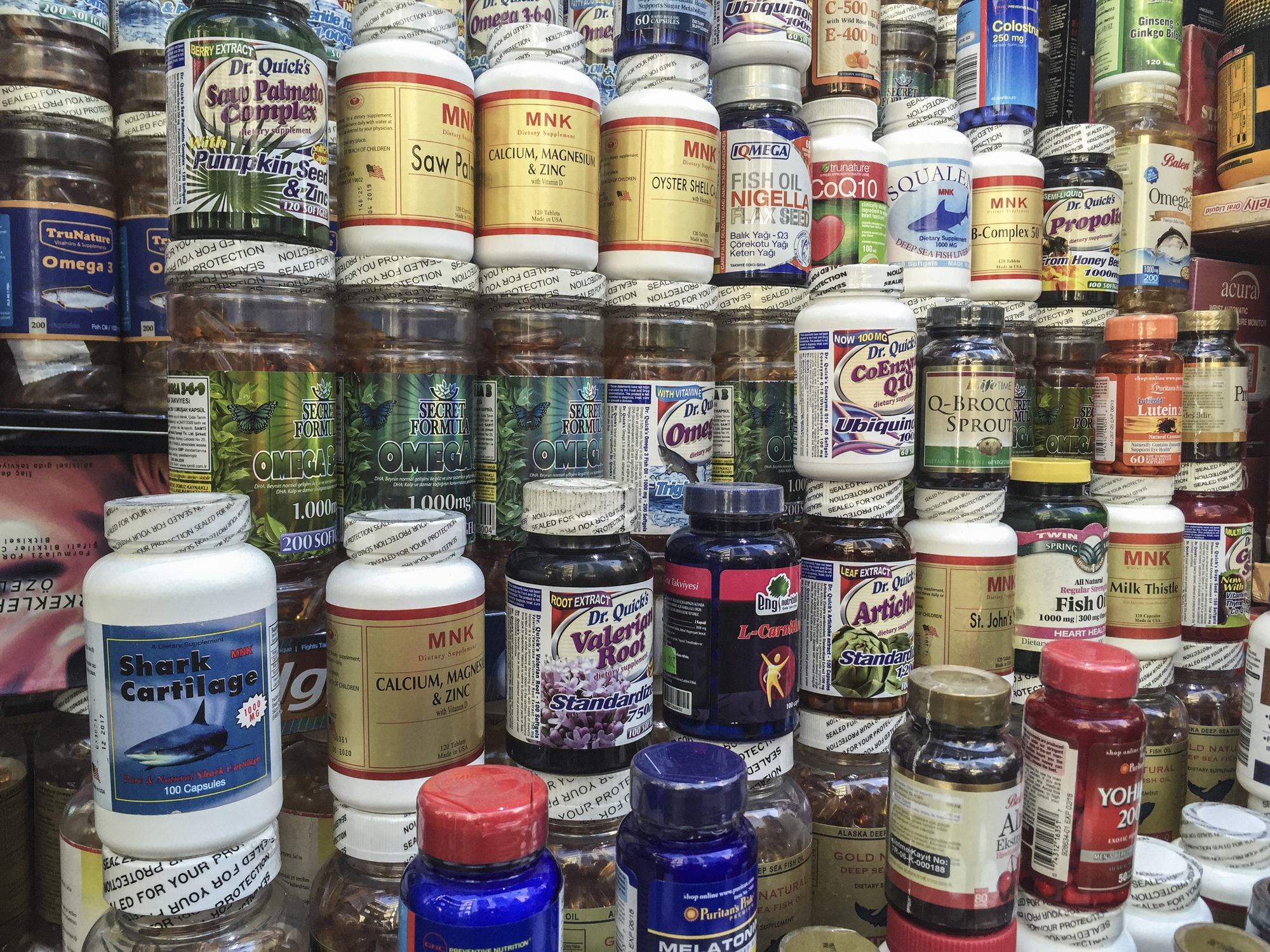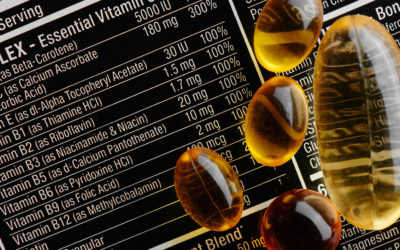When you buy supplements, are you getting what you paid for?
Don’t fall for irrelevant hype and flashy sales tactics.
Know what you’re buying.
Here’s how to find quality supplements…
First of all, there’s a mountain of confusion out there in the profit-driven supplement market. So many products. So much hype. So much pressure to take the thing that will deliver ultimate health, healing, and longevity.
Fact is, not all supplements are created equal and not all companies hold themselves to the high standards we’d hope they would. Some of these tablets and powders contain contaminants or undisclosed ingredients, while others simply don’t provide the amount or form of nutrients they claim to.
Here’s my tip sheet:
Check the label for third-party certifications.
These are independent organizations that test supplements for quality, purity, performance and potency. They provide unbiased verification of a product’s quality, and each has its own set of standards and requirements that must be met for manufacturers to gain their seal approval. Some organizations conduct yearly routine site inspections while also relying on samples provided by the manufacturer.. However, it’s important to note that not all supplements are certified by these agencies. Furthermore, certification doesn’t guarantee that a supplement is safe or effective for all everyone. As a consumer, it’s up to you to research, consult with a healthcare professional, and read labels.
Some examples of reputable third-party certifiers include:
- US Pharmacopeia (USP): USP is a non-profit organization that sets standards for the quality, purity, and potency of medicines, dietary supplements, and other healthcare products. USP’s Verified Dietary Supplement Program verifies a supplement meets certain quality standards, including ingredient identity, strength, purity, and quality.
- NSF International: NSF is a non-profit organization that develops and certifies standards for public health and safety. NSF’s Dietary Supplements Certification Program verifies a supplement meets certain quality standards, including label accuracy, ingredient safety, and manufacturing practices.
- ConsumerLabcom: ConsumerLab.com is an independent testing organization that tests and reviews dietary supplements and other healthcare products. ConsumerLab.com’s Seal of Approval verifies that a supplement meets certain quality standards, including ingredient identity, purity, and potency.
- Informed Choice: Informed Choice is a certification program that verifies they have tested a supplement for banned substances and find it safe for use by athletes and other individuals who undergo drug testing.
- Natural Products Association (NPA): NPA is a trade association that represents the natural products industry. NPA’s Natural Seal program verifies a supplement meets certain quality standards, including ingredient safety, manufacturing practices, and environmental sustainability.
- USDA Organic: The USDA Organic certification program verifies a supplement is made with organic ingredients and meets certain standards for farming, processing, and handling practices.
- Non-GMO Project Verified: The Non-GMO Project Verified certification program verifies a supplement does not contain genetically modified organisms (GMOs) and meets certain standards for testing and verification.
- Certified Vegan: The Certified Vegan certification program verifies a supplement does not contain any animal products or byproducts and meets certain standards for manufacturing and ingredient sourcing.
- Kosher Certification: Kosher certification verifies that a supplement meets certain dietary requirements for Jewish consumers, such as being made with kosher ingredients and processed according to kosher guidelines.
- GMP Certification: Good Manufacturing Practice (GMP) certification verifies that a supplement is manufactured in a facility that follows strict quality control and safety standards, including ensuring the accuracy of ingredient labels, purity and potency of ingredients, and proper sanitation and storage practices.
- B Corporation: B Corporation awards certification to companies that meet certain standards for social and environmental performance, transparency, and accountability – verifying the company is committed to sustainable and ethical business practices.
- Rainforest Alliance: Rainforest Alliance certification verifies that a supplement’s ingredients have been sourced from farms and forests that meet certain standards for sustainability and ethical treatment of workers.
- Fair Trade USA: Fair Trade certification verifies that a supplement’s ingredients have been sourced from farmers and workers who are paid fair prices and wages, work in safe conditions, and protect the environment.
Read the label:
Labels are notoriously confusing, but it’s important to know what you’re putting into your body. This may take little time, but the pay-off is worth it.
Here’s a short loss of important things to look for:
- The name and quantity of each ingredient: Make sure the label lists the active ingredients and their amounts. If the label only lists a “proprietary blend” or “complex,” it may be difficult to know exactly what you’re getting. Here’s the thing -proprietary blends are mixtures of different ingredients that are labeled as a single ingredient and therefore don’t avoid disclosing the amount of individual ingredients.
- The serving size: Make sure you understand how much and how often you should take the supplement. You may think you’re getting a good deal, only to find you need to take 4 tablets to get the advertised dosage. It’s important to note that the daily value percentages listed are based on a 2000 calorie diet, so adjust accordingly if your calorie needs are different.
- The form of the nutrient: Some nutrients, such as vitamin E, can come in different forms (e.g., alpha-tocopherol, gamma-tocopherol). Some forms of nutrients are more easily absorbed and utilized by the body than others. For example, magnesium citrate is more easily absorbed than magnesium oxide. Choose supplements with the most bioavailable nutrients. And, Don’t be fooled by complexes … not all ingredients are synergistic and some can be counter-active.
- The expiration date: Check to make sure the supplement has not expired or is close to expiring.
Check for potential interactions:
Some supplements can interact with medications or exacerbate certain health conditions. If you’re unsure or have concerns about potential interactions with medications or health conditions, talk to your healthcare provider. It’s the smart thing to do.
Look for clinical evidence:
Look for supplements that have been studied in clinical trials and have demonstrated effectiveness for their intended use. Keep in mind that not all supplements have been studied extensively, and more research is often needed to confirm their benefits. Also note that the claim “Clinically Tested”, doesn’t mean “clinically proven to work”.
Be wary of exaggerated claims:
Be skeptical of supplements that make unrealistic claims. No supplement can cure all ailments, and should not be used as a substitute for a healthy lifestyle. But you knew that, right?
Buy from reputable sources:
Buy from your tried-and-true health food store, or from online retailers with a trustworthy reputation. Be suspicious of unfamiliar websites or sources that offer questionable discounts or promotions. Pro tip – when buying from Amazon, make sure you’re buying from the manufacture, not a third party seller. I’ve learned this the hard way.
Check for allergens:
If you have any allergies or sensitivities, check for potential allergens on the label. Common allergens include dairy, soy, gluten, and nuts.
Avoid megadoses:
Taking too much of certain nutrients, such as vitamins A and D, can be harmful to your health. Check the recommended daily dose on the label.
Consider your needs:
When choosing a supplement, consider your individual needs and goals. For example, if you are a vegan, you may need to supplement with vitamin B12. If you have joint pain, you may benefit from supplements containing glucosamine or chondroitin. Always choose supplements that align with your specific needs and goals.
Check for fillers and additives:
Some supplements may contain fillers and additives, such as artificial colors, flavors, and preservatives, that may not be necessary or worse … may be harmful to your health. Beware of long lists of chemical sounding names you can’t pronounce.. A few companies pride themselves on using natural plant based or natural expedients, like Thorne and Garden of Life. I’ll give a more detailed report about this on future posts.
Look for sustainable and ethical sourcing:
Some supplements may contain ingredients that are not sustainably sourced or may be unethical. For example, some fish oil supplements may be made from unsustainable or overfished sources.
Check for country of origin:
The country of origin can be an important factor to consider when choosing supplements. Some countries have stricter regulations and quality control measures than others.
Consider the cost:
While the cost should not be the sole factor in choosing a supplement, it can be an important consideration. Higher-priced supplements are not necessarily better than lower-priced ones, but extremely cheap supplements may be of lower quality or may contain fillers and additives.
Start slowly:
If you’re trying a new supplement, start with a lower dose and gradually increase. This can help you avoid potential side effects and ensure that the supplement is well-tolerated by your body.
Research the company:
Spend a little time researching the company. Check out their manufacturing processes, quality control standards, customer review and whether they’ve had recalls or safety issues in the past.
Talk to your healthcare provider:
Finally, if you’re unsure about a supplement or have any concerns about potential interactions with medications or health conditions, talk to your healthcare provider. If you’re lucky, they can provide personalized recommendations and help you make informed decisions about what’s right for you.
A word about the FDA.
The FDA regulates supplements under the framework of DSHEA. This organization requires supplement manufacturers to ensure that their products are safe and properly labeled. However, It does not require pre-market approval or testing for efficacy before a product can be sold to consumers. Instead, the FDA regulates dietary supplements through a post-market surveillance system, which means they monitor the safety and quality of supplements that are already on the market and take action against companies that are found to be selling unsafe or mislabeled products.
That said, the FDA does regulate additives in dietary supplements, requiring manufacturers to comply with regulations regarding the use of food additives in supplements. Under FDA regulations, a food additive is defined as any substance that is intended to become a component of a dietary supplement and that is not generally recognized as safe (GRAS) for its intended use in food. The FDA maintains a list of food additives that are approved for dietary supplements, and they require manufacturers to submit safety data and other information before a new additive can be approved. But we all know stuff falls thru the cracks, as any google search will confirm.
OK … This is a lot, I know. But we’re bombarded with a myriad of products each claiming to provide more than their competitors. Be smart. Be diligent. Do your homework…or, better yet, just let me do it for you.
I’ll be providing more posts helping you sift through “THE BEST OF THE BEST” in supplements. Count on it. I’m geeky that way.
Here are a few websites to check out:
- https://www.nsf.org
- https://www.nsf.org/health/dietary-nutrition-supplements-personal-care-products
- https://www.usp.org/verification-services/verified-mark
- https://www.fda.gov/food/dietary-supplements/dietary-supplement-ingredient-directory





0 Comments